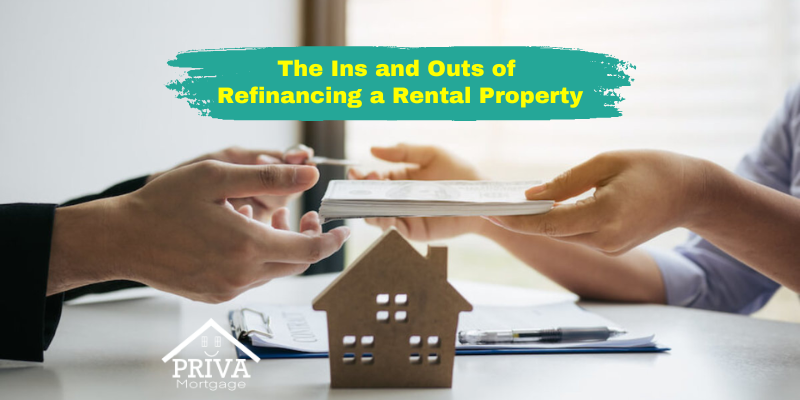The mortgage you borrowed to buy a rental property isn’t the only mortgage you can have on the property. If interest rates change, or you earn equity in the home and want to use it, you may be able to refinance a rental property to get more attractive terms.
The process is similar to refinancing your primary residence, but there are some nuances you should understand before applying.
Here’s everything you must know about refinancing a rental property.
Reasons to Refinance a Rental Property
Sometimes it makes sense to refinance a rental property. Whether you need to save money on your payment or you have equity to tap into, there are many reasons homeowners refinance rental properties, including the following:
- Lower the payment – If you can’t afford the current payment or see an opportunity to lower it with a lower interest rate or longer term, you may consider refinancing. Be sure to look at the big picture to ensure it makes sense in the long run to refinance.
- Shorten the term – If you can afford a higher payment, you may consider refinancing into a shorter term to pay the loan off faster, so you own the home without a loan.
- Using your home’s equity – If you’ve built equity in the home, you may want to use it to buy another rental property, make home improvements, or debt consolidation.
When Should I Refinance My Rental Property?

Most lenders require homeowners to have a loan for at least six months before refinancing, especially if you’re taking cash out. However, if you’re refinancing to improve the terms and are not taking cash out, you may refinance sooner.
Before refinancing, make sure it makes sense to do so. For example, if you’re refinancing to save money, think about how long you’ll have the property. Next, determine how much you’ll save by refinancing and see if you’ll own the home long enough to cover the closing costs.
For example, if you’ll save $200 a month, closing costs are $5,000, and you plan to keep the home for five years, it would take 25 months to pay off the $5,000 in closing costs with the savings, so it makes sense.
However, if you’re tapping into equity or shortening the term, this doesn’t apply. Just make sure you can comfortably afford the payment to avoid the risk of losing the home.
Are There Downsides to Refinancing your Rental Property?
Like any personal finance decision, there are some downsides of refinancing a rental property that you should consider, including the following.
You’ll Pay Closing Costs
All loans have closing costs, which could be 2 – 6% of the loan amount. Figure in these costs when determining if refinancing makes sense.
You Put your Home at Risk
If you borrow more money than you already owe, you put the home at higher risk of foreclosure. The home is collateral, and if you miss too many payments, the bank could take possession of it.
You’ll Reset the Amortization Schedule
Unless you borrow a loan with a term equal to or less than the current term, you’ll add to the time it takes to own the home without a loan.
Qualifying to Refinance a Rental Property
To refinance a rental property, you’ll go through the same procedures you did when you bought the property. In addition, you must prove you have the income, assets, and credit score to qualify for a new loan.
Every lender has different requirements, but here’s what the average lender requires.
- Credit scores of 660+
- Debt-to-income ratio no higher than 43%
- Stable income and employment for two years
- Adequate equity in the property (usually 20%)
- Proof of rental income for the last two years (or less if you’ve owned the home for less time)
The actual requirements depend on your chosen loan program and the lender’s requirements. Typically, for rental properties, lenders require more equity and higher credit scores because there’s a higher risk of default.
Since it’s not the property you live in, if you have trouble making payments, it’s easier to walk away from a rental property than a property you live in and need for your family.
How to Refinance a Rental Property
To qualify for a rental property refinance, you must complete a loan application and provide the following documents:
- Paystubs from the last month
- W-2s from the last two years
- Tax returns from the last two years if self-employed
- Leases from any rental properties
- Asset statements for the last two months
Your lender may ask for additional documentation, depending on your situation. For example, if you need the rental income for your debt-to-income ratio to qualify, lenders may need more information about the property’s rental history.
Can you do a Cash-Out Refinance on a Rental Property?
If your rental property earned equity, you might want to use it for other purposes, such as renovations, buying another home, or consolidating debt.
While it’s trickier to qualify, you can get a cash-out refinance on a rental property. The key is to prove you can afford the higher payment. If you can afford it without rental income, your chances of refinancing increase, but if you have a solid history of rental payments, you may use it to qualify.
Bottom Line
Refinancing a rental property is possible, but it may require stricter qualifications and documentation. The key is proving you can afford the new loan and have a solid credit history demonstrating timely payments.
It may take a little work to find a lender that will refinance your rental property, but with the right help, you can reach your financial goals with your rental property.






